 |
 |
 |
 |
 |
 |
 |
 |
 |
FA Cup semi-final - City Ground, Nottingham - 46,300
Scorers: Bremner
Manchester United: P Dunne, Brennan, A Dunne, Crerand, Foulkes, Stiles, Connelly, R Charlton, Herd, Law, Best
Leeds United: Sprake, Reaney, Bell, Bremner, J Charlton, Hunter, Giles, Storrie, Peacock, Collins, Cooper
As Eric Stanger reported in the Yorkshire Post: 'Perhaps it is
as well there is a replay at Nottingham on Wednesday. At least it will
give both sides opportunity to show that they can play good football and
redeem themselves for a shabby, bitter FA Cup semi final at Hillsborough
on Saturday. There were no goals but there were 24 free kicks for fouls
given against Manchester United and 10 against Leeds. Two Manchester players,
Stiles and Law, had their names taken and altogether too many players
on both sides behaved like a pack of dogs snapping and snarling at each
other over a bone.' Leeds manager Don Revie chose to
paper over the controversy, saying: 'We shall do better on Wednesday now
we know what it is all about. Remember this is our first semi-final. I
was a bit worried at half time but we played much better against the wind
and I am sure we can win the replay and get to Wembley.' Despite many fitness doubts on both sides following the bruising encounter,
the only change to either team was Terry Cooper replacing the injured
South African Albert Johanneson
on the Leeds left wing. Cooper had been unlucky to miss the first match
through injury having featured regularly over recent weeks as either left-back
or left winger, and the bloody minded assaults on Johanneson at the weekend
made Cooper's recall a formality. Referee Dick Windle had been heavily criticised for losing control of
the first game, but was officiating again. This time he seemed determined
to take a much firmer approach to matters and clamped down on any misdemeanours
from the start. His change in approach quickly reaped rewards and the
players showed much more discipline. There were again far too many fouls,
20 against the Mancunians and five against the Whites, but most were for
petty offences, rather than aggressive play. As The Times reported, 'This may sound like Dante's Inferno but
by comparison with last Saturday both sides trod a primrose path. We were
no longer truly at a ringside and the ball was now a ball and not a time
bomb; yet it was still a hard battle, razor keen, a true passage of arms
with all the deep qualities of a taut Cup-tie. Both sides regained some
stature and though there was a free flow of free kicks, most of them were
of a technical nature. The gloss of the game had now returned and with
it both sides had apparently learnt a little wisdom, a little patience
and tolerance. Both still took as well as gave, but what was now given
was cleaner, even if it was still no tea party where people are treated
with an elaborate manner.' Matters were helped by the marked improvement in playing conditions.
At Hillsborough the players had to contend with a churned up bog of a
pitch, sticky and holding and mitigating against expansive play. Nottingham's
City Ground offered a fast, dry surface that the players were thankful
for, taking the opportunity to rise above barbarism and opting instead
for skill. Once again, Leeds seemed content to rely on their defensive excellence
to see them through, with Bobby Collins
dominant. The Yorkshire Evening Post's Phil Brown noted that Collins
'was again invaluable, pulling United out of trouble at one end of the
field, and touching off their attacking at the other', while Eric Stanger
of the Leeds saw to it that the skillful Pat Crerand never got the chance to
control the game. Jim Storrie: 'Terry
Cooper played at number 11, but had to mark Crerand. Crerand was a great
passer … could land the ball on a beer mat from 40 yards. So we cut off
his supply. It was like starving a deep-sea diver of oxygen and meant
that Stiles and Foulkes, who were less gifted, had to put balls through.
And instead of the goalkeeper being able to find Crerand, he had to kick
it upfield where Jack Charlton
would win it in the air. Best, Law and Charlton were locked in their own
half of the field. 'In the previous match, Pat Crerand had been at the hub of almost every
United attack. When Leeds were on the attack, he would fall back, not
playing any part in his side's defensive play, but staying spare so that
United could find him with a clearance. Terry's job was to move infield
and pick up Pat, and in the first half this had the desired effect of
choking the supply of passes to him. 'Pat was fouled by Terry on one occasion, and made the mistake of chasing
after him to get his own back. He forgot about his duties, with the result
that Charlton and Law were forced to come deep in an effort to get the
ball themselves.' The Peacocks had little option but to go for a rearguard action, for
the Red Devils seemed determined to make up for missing out first time
around and took control of the game early on. Stanger: 'It was rich, rousing
Cup football. Manchester United began as if they would make a meal of
Leeds, switching play forward or across the field with fine dexterity.
Early on Leeds owed much to Sprake, who made fine saves from Herd and
Bobby Charlton. Leeds might well have been a goal down before they found
their feet. But even thus early it was obvious that their defence would
take a terrific amount of punishment without breaking.' After that opening burst, however, with Johnny Giles taking a controlling
interest, Leeds came more into the picture, going close on several occasions.
Most of their chances, though, were achieved by pumping high balls into
the heart of the Manchester penalty area for Alan
Peacock to contest. By half time there was little to choose between
the two teams, although there was a yawning gulf between the quality of
football being played this time against that which had masqueraded deceitfully
under that term in Sheffield. Again, Matt Busby's men started the better after the break, but this
time their dominance was total and for the first twenty minutes there
was only one side in it. The Times: 'Soon after the change of ends a superb long through
pass by Charlton found Best's head, from the centre-forward position,
but the ball was grabbed with masterful ease under the angle of crossbar
and post by Sprake. Then a quick triangular move, three pass rat-tat-tat
between the quicksilver Law and Herd saw Law cut through the middle and
close in, like a flash. It was any odds on a goal but the Manchester roar
of 'goal' was choked as Sprake made a remarkable point blank save from
the Manchester captain. Almost at once Law broke clear once more down
the right, pulled the 'Hardly was that over than Law beat three men in a sizzling run, passed
square across the goalmouth, and once more Herd, with time and space on
his side, shot wide, left footed. In those moments did Manchester live
and die, on firm, perfect conditions that should have suited their style
of play. Law, supported by R Charlton and Crerand, had the genius to win
this match, but it escaped him and his side.' But the Leeds team of 1965 was nothing if not resolute, and Jack Charlton,
Paul Reaney and Willie Bell were playing
like Colossuses in front of Gary Sprake. Bobby Collins, Billy Bremner,
Norman Hunter and Terry Cooper did what they could to provide some respite
when the opportunity arose, but were little more than additional conscripts
in defence. Jim Storrie and Alan Peacock defended manfully from the front, while
Johnny Giles played wonderfully well to maintain a grip in midfield, popping
up all over the place to keep Leeds hopes alive. Gradually, the storm abated, and the Yorkshiremen sensed that the Mancunians
were beginning to doubt they could pierce the resilient defence. Stanger:
'Leeds turned the game. Manchester were surprised in one raid when Jack
Charlton headed a free kick from Collins inches wide of a post. It proved
the flashpoint for Leeds' match winning rally, though they had one uneasy
moment when Sprake dropped Connelly's corner but recovered to turn the
ball over the bar as Law went in for the kill.' Manager Don Revie was never one to let an opportunity pass him by and
noted with relish the change in fortunes. He could see that Matt Busby's
men were fading and issued his orders to capitalise on the moment. He
pulled Giles back to a deeper, more central role, moved Storrie out wide
on the right and thrust Bremner forward as an auxiliary attacker. Bell
and Reaney were encouraged to push forward on the overlap at every opportunity,
giving the Whites valuable attacking options. The tide had definitely turned. At first, Leeds merely held their own
and assumed equality in terms of possession, but as the game moved into
its fateful last quarter, they came to dominate matters, attacking with
passion, pace and fire and throwing the Red Devils back on their heels. Stanger: 'Back went Leeds again, and in the last ten minutes they attacked
continuously. Three times Pat Dunne had to turn the ball over his The seconds ticked by with still no goals to show for all the effort,
and the uncertainty of extra time beckoned. The match moved into its final
two minutes of normal time, and Nobby Stiles floored Bremner with a late
tackle in the centre circle, seemingly happy to trade a long-range free
kick for the certainty of stopping a quick break. Giles floated the ball
unerringly into the heart of a crowded goal area. Bremner, mind working overtime, weighed up matters more speedily and
precisely than his opposite numbers. He flashed past three or four defenders
and moved in on the steepling place kick. With his back to goal he twisted
artfully under the ball and nudged it miraculously with his head past
Pat Dunne, through a tiny chink in the defensive wall and into the top
corner of the net. For what seemed an eternity but was in reality milliseconds, things seemed
to move in slow motion with an eerie silence before an explosion of noise
and sound. Then, without quite understanding how he got there, Bremner
found himself out on the touchline, being mobbed by excited team mates,
in joyous celebration of what was certain to be the winning goal. Leeds
had done it! They had broken the deadlock with a stunning goal owing much
to sharp thinking and speedy reactions, but most of all to their never-say-die
resilience and spirit. The Red Devils tried a last-ditch, all out assault to regain equality,
but Leeds were in no mood to surrender their hard won advantage and repelled
the feverish attacks. When referee Windle blew his whistle to signal the end, the crowd swarmed
onto the pitch, Leeds followers jubilant at the result and Manchester
fans angry because of what they saw as one-eyed refereeing. Windle was
struck by a Reds supporter and fell to the ground, requiring attention
from ambulance men and protection from the police as the culprit was apprehended. The Leeds party was just beginning, oblivious to what was going on around
them, and they celebrated furiously. As commentator Kenneth Wolstenholme
remarked memorably, 'Don Revie's gone mad!' For Jack Charlton, finally out of the shadow of his famous younger brother,
it was a memorable day. He had withstood everything that Manchester United
could throw at him for 270 long minutes, counting the
win in the league at Old Trafford in December, and had proven himself
possibly the best defender in the country, contributing manfully to three
clean sheets secured against the finest forward line in Europe. He had other good news to share, as he explained in his autobiography: 'Right after the game Don told me that I had been selected to play 'I'm smiling all over me face, and there's all the Manchester United
team sitting round looking miserable. There was a bit of a pause, and
then Bobby went, "Ah, yeah, well, congratulations, great." "Now,
f*** off out of here," said someone else. 'And I suddenly realise what I'm doing, so I said, "Excuse me,"
and left. That's the tact I'm famous for.' Big Jack could be excused for forgetting himself on an evening that went
down in history as the moment that Leeds United finally made it into the
big time, entering football's elite by securing a
first ever appearance at Wembley, the Mecca of English football. Don Revie: 'My proudest moment in my career was when the whistle went
… and Leeds United were in the final. Manchester played some absolutely
scintillating football. I thought we were going to crack and we were certainly
lucky not to go two down but we came through it, and according to my instructions,
if there was still no score, Jim Storrie switched to the right wing and
Bremner moved into the attack. It might not have come off, but it did.
What pleased me most was that Leeds kept their heads."'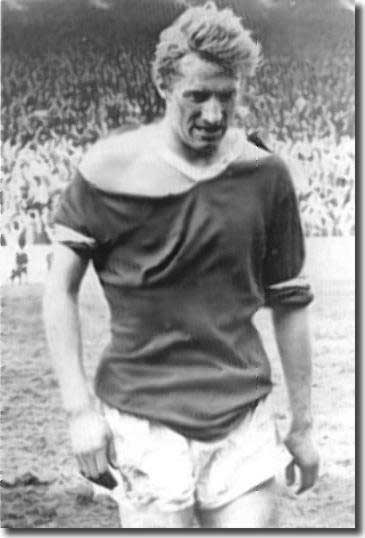 The first clash between Manchester United and Leeds
United in the FA Cup semi-final of 1965 had ended in a bitter and
rancorous goalless draw, with both sides more intent on kicking opponents
than seizing the chance of a Wembley place.
The first clash between Manchester United and Leeds
United in the FA Cup semi-final of 1965 had ended in a bitter and
rancorous goalless draw, with both sides more intent on kicking opponents
than seizing the chance of a Wembley place.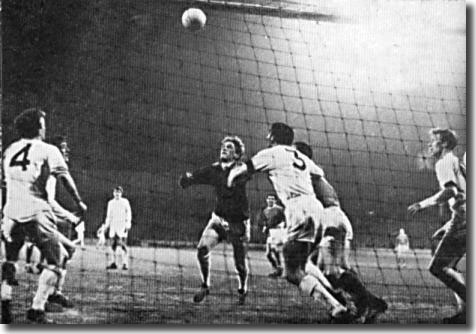 Yorkshire
Post called the Scot 'the cool, masterful general, who extricated
Leeds from many a tight corner'.
Yorkshire
Post called the Scot 'the cool, masterful general, who extricated
Leeds from many a tight corner'.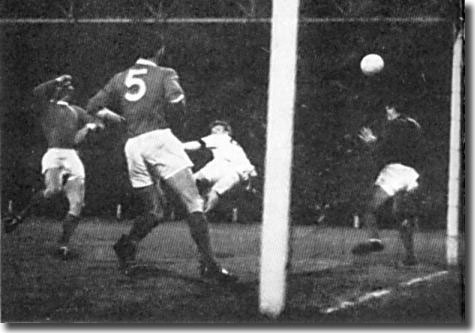 defence apart, momentarily only, for Herd to blast wide into the side
netting with Best standing unmarked on the goal line. A quiet look then
by the centre-forward and Manchester must have been ahead.
defence apart, momentarily only, for Herd to blast wide into the side
netting with Best standing unmarked on the goal line. A quiet look then
by the centre-forward and Manchester must have been ahead.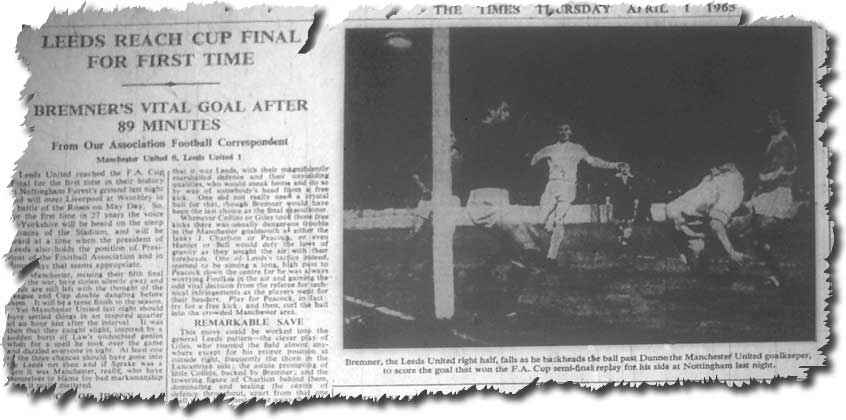 bar and then did the same with a tremendous volley from Cooper off the
fifth successive corner Manchester had been compelled to yield.'
bar and then did the same with a tremendous volley from Cooper off the
fifth successive corner Manchester had been compelled to yield.'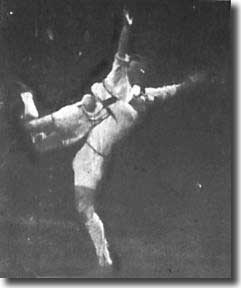 for
the national squad. I was so delighted that I didn't think, I just had
to tell our kid. I went straight round to the Man United dressing room
and said, "Hey, I've been selected to play for England!"
for
the national squad. I was so delighted that I didn't think, I just had
to tell our kid. I went straight round to the Man United dressing room
and said, "Hey, I've been selected to play for England!"